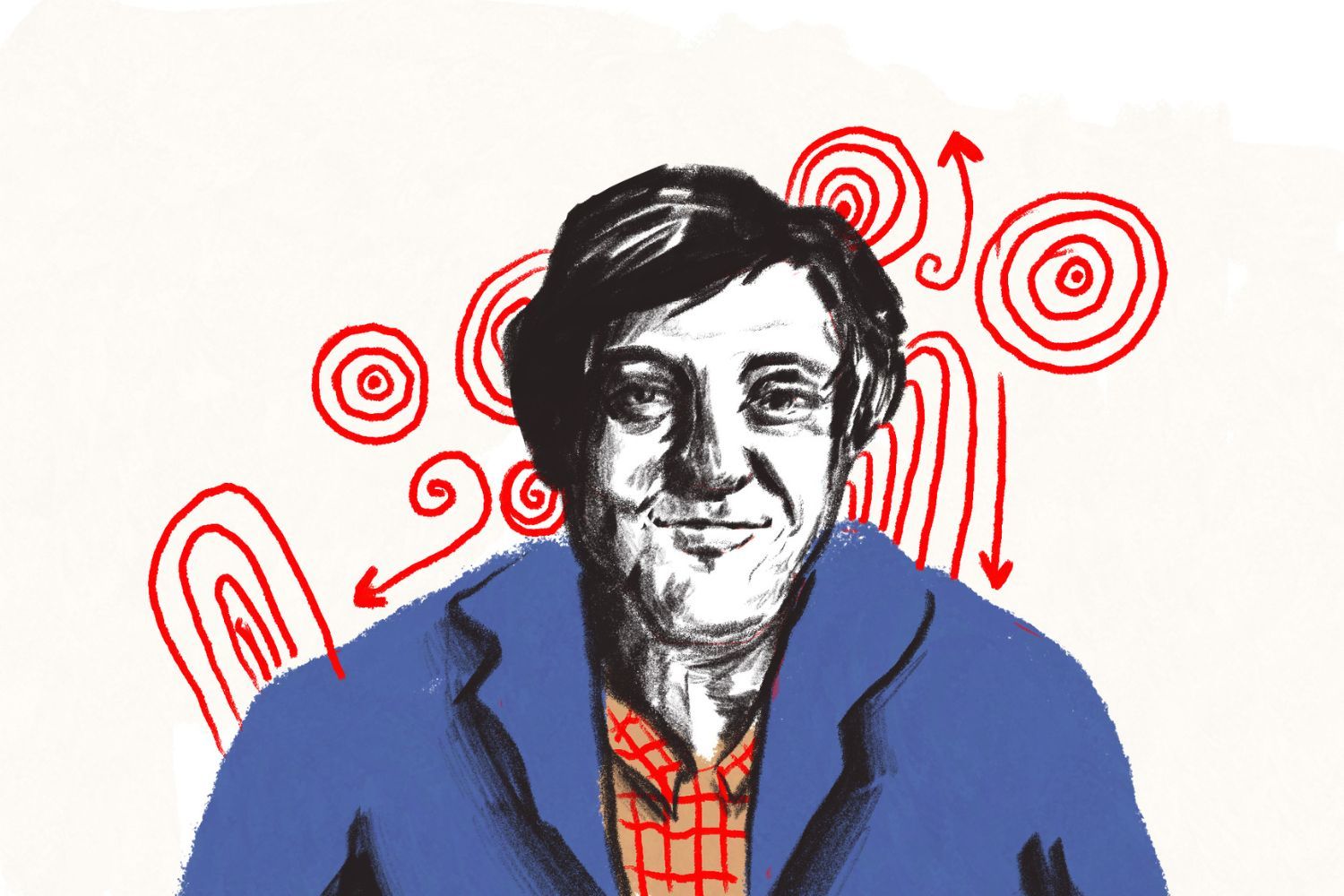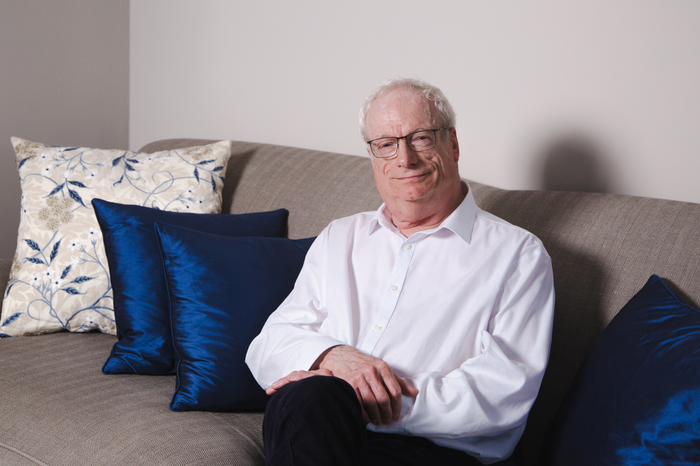It may be because I’ve grown up seeing him on television, but there is an instant feeling of familiarity when Stephen Fry joins the Zoom call, immediately greeting me with a cheery, “hello there!”. In the background there is, as you might expect, a wall of bookcases filled to the brim alongside a big television – I can’t help but think this perfectly sums up Fry’s diverse career, being at once an actor, comedian, broadcaster, narrator, director and writer. We exchange the typical British pleasantries about the weather, with Fry noting how “everybody’s lifted by the sun,” before we dive into his time at Cambridge.
Fry was certainly unique among his cohort, having spent a few months in prison after he “stole some credit cards and went ape, at the age of 17, around the country”. In fact, he was still on probation when he started his degree. The professors “had no idea because it’s not a question they ask,” he chuckles. “I hadn’t lied, I’d just simply withheld a particular truth.” He remembers going up to one of his tutors at the end of his first year and saying, “I’m very happy today, Dr. Holland, because today I’m off probation.” This was met with a startled response when his tutor discovered that he did not in fact mean some sort of academic probation, but “actual, genuine, judicial probation”. Following his time in prison, having “flunked everything” and being “expelled from a number of schools,” Fry was admitted to a college in Norwich to complete his A-levels, where he then paid to sit the Cambridge entrance exam. Despite his unconventional route here, with prison being “quite violent and unpleasant,” it did stand him in good stead for having to fend for himself upon arrival: “All the issues that might have struck a young person arriving in a place like me for the first time were nothing to me; it was a breeze if you like.”
“I hadn’t lied, I’d just simply withheld a certain truth”
He quickly adds that he did feel the inevitable imposter syndrome all students experience at some point during their degree. There are “real issues with competence and happiness and mental health at Cambridge,” with many undergraduates finding it “a fearsome place” when they first arrive, he reflects. To him, it initially seemed that “everybody I bumped into could speak six languages and had read every Russian novel and every German poet and that I would be exposed as an ignoramus and Philistine and a barbarian and unworthy of the sacred cloisters and courts.” This feeling soon faded as he realised that “it’s very exciting to be with smart people smarter than you” as this only helps you to improve. “They didn’t make me feel a fool, but they made me feel that I had a long way to go,” he tells me, referencing his friend Christopher Hitchens, who said “the definition of education is to discover the limits of your knowledge. An educated mind knows how much it doesn’t know.” Although one should never “believe oneself unworthy,” he thinks that it is necessary to know your imperfections. For Fry, a true university education is not about believing “one’s got to the shining golden hill of knowledge and enlightenment,” but understanding that there are limits to your knowledge and education. “To learn how stupid you are is one of the great passageways into education and understanding,” he says: “I know how stupid I am in all kinds of areas.”
It only takes Fry five minutes to mention Oscar Wilde, quoting a letter he wrote to Lord Alfred Douglas to further explain his ideas about what “a good university education is”. For Fry, as for Wilde, it is “the ability to play gracefully with ideas” – something he believes is facilitated by the plethora of extra-curricular opportunities in Cambridge which “contribute enormously to one’s sense of understanding the world”. He remembers how “there was absolutely no compunction to work,” instead throwing himself into drama: “I think I did nine plays in my second term.” Telling me that “you’d just shove a note into your supervisor’s pigeonhole saying, ‘Oh, unfortunately I’ve been thinking very hard about Edmund Spenser, but I haven’t yet got an essay,’” his time at Cambridge was filled with running to and from rehearsals. Fry had received a scholarship to study English Literature at Queens’ College, and so there was a certain amount of expectation for him “to do well and get a first and stay on and research, but it soon became pretty clear that was not my ambition”. Although he toyed with the idea of becoming an academic, “getting rooms in a cloister somewhere and gladly brewing tweed and giving supervisions and writing little pamphlets and then books on Shakespeare,” ultimately, “I knew it wasn’t me.”
“Everybody I bumped into could speak six languages, and had read every Russian novel and every German poet”
Comedy and performance were Fry’s passions; growing up, he was “an absolutely fanatic fan of comedy,” buying records of various comedians rather than popular bands. At Cambridge, he began to pursue his enthusiasm for entertaining, spending his first two years doing lots of theatre alongside his close friend Emma Thompson. “I just went insane,” he says, “I just fell in love with it completely and went to every audition.” It was Thompson who encouraged him to join the Footlights in their third year, introducing him to the president: Hugh Laurie. Fry remembers how “she took me around to Hugh’s rooms in Selwyn and we just fell in love. Not in a homoerotic way, but in a sort of bromance, work way and in a comedy way.” Imitating Laurie, he recounts their first interaction, which entailed him helping Laurie finish writing a song: “We just simply fell into it. And we carried on like that for the rest of our year.” That summer of 1981, he and the Footlights went to the Edinburgh Fringe Festival and won – against all expectations – the inaugural Perrier Comedy Award, being presented with it by none other than Rowan Atkinson. He impersonates Atkinson while describing the moment “the cheering went insane” when he stepped onstage behind them. As a result, they got the opportunity to tour around Australia, with the BBC putting their show on television: “This is really a story of outrageous luck that would make people want to punch us in the face because it just seemed to fall into our laps, I can’t deny it.”
Reflecting on the Footlights’ success, Fry attributes this to their innovation, believing they “touched the right nerves”. Unlike the previous year, which had “been full of tap dancing and show tunes,” they stuck to simple sketches. It was “kind of like 50s jazz,” he explains, suspecting that people “liked the atmosphere of it”. They experimented with a humour that wasn’t widely popular at the time, incorporating lots of verbal comedy into their sketches: “I can’t help it, but I just run away with language because I love it so much. And I love playing with it.” For their audiences, the Footlights’ innovation “was a bit like being tickled in a place that hadn’t been tickled for some time,” he says. “One of the things that you need to offer when you’re starting out in comedy is to find a new place to tickle people.”
“This a story of outrageous luck that would make people want to punch us in the face”
This need for novelty is reflected in Fry’s own lifelong thirst for knowledge, appearing on University Challenge while at Cambridge and later presenting the BBC’s QI for 13 years. He likens himself to Autolycus from The Winter’s Tale, “who was a snapper up of unconsidered trifles,” attributing this love of learning to “seeking attention as a child” and being “so hopeless at all the things that I wished I was good at,” including sport and music. “I was all prepared to believe that I was just a dunce and hopeless, but I discovered that I had this facility for language,” he tells me. This discovery led to him spending his evenings in the dormitories at school reading and telling stories, giving him “a security amongst the other boys”. “They forgave me for the fact that I couldn’t catch a ball” and that “I sang flat in hymns,” Fry explains. Accumulating knowledge allows him to express “a sort of competitiveness that I can’t express on the sports field, so I express in the arena of fact”.
Throughout our conversation, Fry’s fondness for his university days has been clear, sending “love to Cambridge” as we draw to a close. While other moments of your life “disappear in the rear-view mirror,” becoming smaller as time wears on, “actually a place like Cambridge never really becomes small because there’s so much packed into those three years.” The significance of his time here is such that our discussion never truly strays away from it, much as with Fry himself, who has a house in Norfolk only half an hour away from the city. “Maybe you’ll see me striding along,” he tells me, “I sometimes go into Heffers and pile up on books, or into the University Library.” With this casual remark, our conversation ends in that same familiar tone with which it started: “I’ll see you anyway. Nice to have chatted.”


